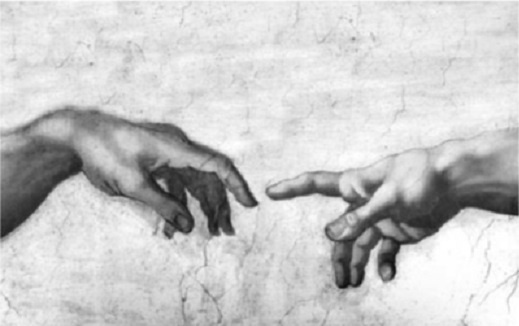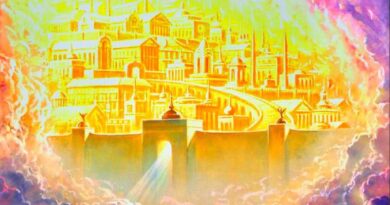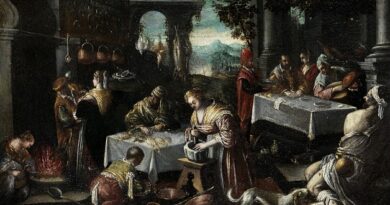The Truth About Death And Resurrection
“As by a man comes death, by a man also comes the resurrection of the dead; for as all in Adam die, even so shall all in Christ be made alive.” — 1 Corinthians 15:21-23
There is a longing hope within them. existence. But can we find a rational basis for believing in life after death? There are so many religions and so many philosophies as to the state of the dead that it is hard to discern the truth of the matter. As Bible students, we should refer to the Bible alone for doctrinal clarity.
HOW DOES THE BIBLE DESCRIBE DEATH STATE?
Human life is composed of the body organism and the mind. The body is made up of the inanimate elements of the earth, while the conscious mind is made up of the composite of experience — the ability to reason, learn, communicate, create, worship, appreciate beauty and exercise free-will. This composite of the body and the mind is what makes up the individual, and death, therefore, is the state at which the individual ceases to exist.
By inspiration, King David confirmed this thought: “His breath goeth forth, he returneth to his earth, in that very day his thoughts perish.” (Psalm 146:4) Thus, the dead are not conscious, for the mind ceases to exist and the body decomposes. “…there is no work, nor device, nor knowledge, nor wisdom, in the grave, whither thou goest.” (Ecclesiastes 9:10) Death, therefore, is the exact opposite of life.
JESUS’ DESCRIPTION OF DEATH
When Jesus’ friend Lazarus died, Jesus described death as sleep: “Our friend Lazarus sleepeth; but I go, that I may awake him out of sleep.” The disciples reasoned, “Lord, if he sleep, he shall do well.” (John 11:3-27) They thought it would be a great mistake to awaken a sick man. Seeing that his disciples misunderstood, “Then said Jesus unto them plainly, Lazarus is dead.” Jesus used the figurative illustration of sleep to emphasize two important points. (1) Those who are asleep are unaware of what is going on in the world around. “The living know that they mankind that death does not end all shall die; but the dead know not anything.” (Ecclesiastes 9:5) (2) The dead are figuratively asleep in their graves waiting for an awakening —the re-animation to life again of both the body and the mind.
That the dead should be restored to life at a future time was not a new idea to Lazarus’ family, for they believed the Old Testament promises which hold out this blessed hope. Centuries before this experience, for example, the Prophet Job inquired, “If a man die, shall he live again?” (Job 14:14) Job knew that death was the penalty for sin, and, because the whole world of mankind were sinners, all were dying. What Job wanted to know was whether the dead would be restored to life ― shall he live again? Job found the answer and expressed it concerning his own hope, saying, “All the days of my appointed time will I wait [in death], till my change come. Thou shalt call, and I will answer Thee…” Job 14:14,15
“THE RESURRECTION AT THE LAST DAY”
The death of Lazarus was not due to his lack of faith in this promise expressed by Job, nor any lack of loyalty to Jesus. Lazarus believed in Jesus, yet he died and remained in the grave four days. In regard to this fact, note what Jesus did NOT say when he came to comfort Lazarus’ family: Weep not, for your loved one is not really dead, for he is now in heaven. No, Jesus said plainly to his disciples, “Lazarus is dead.” The grim reality that Lazarus had been dead in his grave four days proves that he did not go to heaven.
When Jesus said, “Thy brother shall rise again,” Martha replied, “I know that he shall rise again in the resurrection at the last day.” She knew from Old Testament prophets, like Job, that the dead were in their graves waiting for the resurrection in the last day when Jesus would raise the dead. Jesus did not deny the truthfulness of what Martha said, rather, he confirmed her faith, saying, “I am the resurrection, and the life: he that believeth in me, though he were dead, yet shall he live…” (John 11:25, 26) The Apostle Paul also confirmed this: “For the Lord himself shall descend from heaven [at the last day]… and the dead in Christ shall rise…” 1 Thessalonians 4:16
BUT DOESN’T THE SOUL LIVE ON?
The common belief of most world religions is that people possess souls, and at death their consciousness, in the form of that soul, departs from the body to abide in either a paradise or a place of punishment. But it may come as a surprise to some that throughout the Scriptures the thought of an immortal soul is nowhere found. In fact, the Bible clearly states that, before Jesus was rewarded with the Divine Nature, God alone had immortality. 1 Timothy 6:16
The philosophy of an immortal soul which lives on after death was introduced into man’s thinking in the time of Nimrod after the flood of Noah’s day. This ideology continued on in various forms and in various pagan religions. The ancient Egyptians practiced elaborate ceremonies to prepare pharaohs for the afterlife. Later, this concept was adopted from the Egyptians by Greek philosophers. Plato taught that each man contained a fragment of deity and that this would prevent him from ever dying.
The popularity of this philosophy spread, and by about A.D. 200 it was mixed with the Christian doctrine of the resurrection. At that time, Origen, an early and influential church theologian, was greatly influenced by Plato’s philosophy. He wrote: “…The soul, having a substance and life of its own, shall after its departure from the world, be rewarded according to its deserts, being destined to obtain either an inheritance of eternal life and blessedness… or to be delivered up to eternal fire and punishments…” Origen’s view caused great controversy within the early church, primarily because it was not based in Scripture. But it appealed to the Gentile converts who had strong pagan ties. Ante-Nicene Fathers, Vol. 4, 1995, p. 240
Augustine, another influential Christian theologian and admirer of Platonic philosophy, continued to profoundly affect Christian thinking. Richard Tarnas in writing The Passion of the Western Mind (1991, p. 103) points to this influence: “It was Augustine’s formulation of Christian Platonism that was to permeate virtually all of medieval Christian thought in the West. So enthusiastic was the Christian integration of the Greek spirit that Socrates and Plato were frequently regarded as divinely inspired pre-Christian saints…” Like Plato, Augustine proposed that God breathed a little of His deity into Adam and that this entity would never die.
Although strenuously contested as error by many of the honorable church leaders, Augustine’s view won out, and the error became fixed as a foundation doctrine from the sixth century to the nineteenth century when Christians were finally able to study the Bible for themselves. They discovered that the doctrine of an immortal soul was not supported by Scripture.
The International Standard Bible Encyclopedia (1960, Vol. 2, p. 812) states: “We are influenced always more or less by the Greek, Platonic idea that the body dies, yet the soul is immortal. Such an idea is utterly contrary to the Israelite consciousness and is nowhere found in the Old Testament.” In confirmation of this, The Jewish Encyclopedia (1941, Vol. VI pp. 564, 566) states: “The belief that the soul continues in existence after the dissolution of the body is… nowhere expressly taught in Holy Scripture… The belief in the immortality of the soul came to the Jews from contact with Greek thought and chiefly through the philosophy of Plato…”
THE BIBLE DEFINITION OF THE SOUL
The Hebrew word translated soul is nephesh, which means a breathing creature. Vine’s Complete Expository Dictionary of Old and New Testament Words (1985, p. 237, 238) defines nephesh as “the essence of life, the act of breathing, taking breath…” The Hebrew words nephesh caiyah mean living soul and apply not only to man but to all of God’s living creatures: “…to every beast of the earth and to every fowl of the air and to every thing that creepeth upon the earth wherein there is life…” (Genesis 1:30) Notice the marginal reference to life — “Hebrew: a living soul.” Thus, all differences between the lower and higher souls are not because the lower animals have a different breath or spirit of life, for “they have all one breath” and all are considered by God as souls — living creatures. “For that which befalleth the sons of men befalleth beasts… as the one dieth, so dieth the other; yea, they have all one breath; so that a man hath no preeminence above a beast… all are of the dust, and all turn to dust again.” Ecclesiastes 3:19-20
When Adam’s body was formed of the elements of the earth, he had eyes, ears, and a brain, but so far, no ability to see, hear or think. Then, “The Lord God… breathed into his nostrils the breath of life, and man became a living soul.” (Genesis 2:7) The word spirit is, in the Old Testament, from the Hebrew word ruach — breath. Hence we have the expression “breath of life,” because the spark of life once started is supported by breathing. When the breath stops, the spirit of life ends.
Notice, the Bible does not say that God breathed into Adam’s nostrils a soul — a part of His deity. The result of the breath of life having been breathed into Adam was that he “became a living soul.” Adam’s lifeless body was now animated with sense perception — he was now a sentient being able to hear, see, feel, taste and smell. Many reverse this Scriptural statement, and instead of speaking of man as being a soul, they speak of him as having a soul — this is a very different thought.
“AS ALL IN ADAM DIE…”
The Apostle Paul explains that “sin entered into the world, and death by sin.” (Romans 5:12) When our first parents transgressed God’s law, as He warned, He withdrew His favor from them. Without His favor they could not continue to live, and so the sentence was immediately operative, and they began to die. “Dust thou art, and unto dust shalt thou return.” (Genesis 3:19) It is the soul — the mind governing the body — which is responsible for sin, and it is the soul which is to bear the penalty of sin. That penalty is distinctly stated to be death. “The wages of sin is death.” (Romans 6:23) “The soul that sinneth it shall die.” (Ezekiel 18:4) Had Adam remained obedient he would have continued living forever — yet still mortal — liable to death should he become disobedient.
If we attribute to the soul immortality, a condition in which death is impossible, then even God could not destroy it. But the Scriptures plainly state that God is able to destroy the soul. (Matthew 10:28) When Adam forfeited his life, both his mind and body began to die — a death that took 928 years. Thus, by heredity we are all members of a dying race, and, as all of Adam’s race share by heredity in his death penalty, so they all shall be permitted to share in the recovery from the power of the grave in God’s kingdom which is to be established on earth.
“…SO ALL IN CHRIST SHALL BE MADE ALIVE”
Although the Scriptures do not support the thought that the soul is immortal, they do abound with the hope of a resurrection from death in due time. “God will redeem my soul from the grave [sheol — the condition of death].” (Psalms 49:15) When Jesus “poured out his soul [being] unto death,” he made “his soul an offering for sin” and became our ransom from the sentence of death imposed upon Adam and his posterity. (Isaiah 53:10, 12) The promise to mankind, therefore, is a redemption of the soul from the power of death.


“He will swallow up death in victory; and the Lord GOD will wipe away tears from off all faces… for the LORD hath spoken it.”
— Isaiah 25:8 —
Yes, Jesus gave himself “a ransom for all to be testified in due time.” (1 Timothy 2:6) This statement by Jesus is clear — the resurrection of even the faithful from the grave is not to happen until the second coming of Christ in the last days. Until then, all figuratively sleep in the grave. Our theme text in 1 Corinthians 15:22-23 bears this out: “For as in Adam all die, even so in Christ shall all be made alive. But every man in his own order: Christ the firstfruits: afterward they that are Christ’s at his coming.” In other words, there is a definite sequential order to the resurrection of the dead. “For the Lord himself shall descend from heaven with a shout, with the voice of the archangel, and with the trump of God: and the dead in Christ shall rise first.” 1 Thessalonians 4:16
Our Lord further declared this thought when he said: “Marvel not at this: for the hour is coming, in the which all that are in the graves shall hear his voice, and shall come forth. They that have done good, unto the resurrection of life; and they that have done evil, unto the resurrection of judgment.” (John 5:28, 29 RSV) Jesus’ statement, “they that have done good,” refers to Christian believers who have proven faithful to their covenant of sacrifice. These are a little flock in comparison with the billions who have died. (Luke 12:32) The Apostle Paul tells Christians to “put on immortality” implying that they did not already have it inherently. (Romans 2:5-7; 1 Corinthians 15:51-55) Immortality is promised only to those who are now being called, tested, and selected to be jointheirs with Christ in God’s Kingdom.
The vast majority of the dead are of that class which have not done good from the divine standpoint. According to human standards, most of them have been morally upright, but they have not been footstep followers of the Master; hence the blood of Christ has not yet given them a standing of righteousness before God. Nevertheless, God loves these also, and He sent His Son to die for them. These have never had a genuine opportunity to believe — develop faith and obedience.
Billions have never heard of Jesus, and among those who have heard of him there are few who have understood clearly the real purpose of his coming into the world. They have not been intentionally wicked, but they have not done good in the sense of having been proven faithful by God. These billions are to be awakened from the sleep of death and given an opportunity “to come unto the knowledge of the truth.” (1 Timothy 2:4) The great truth which will then be made known to all — clearly and unmistakably — is that Jesus’ death provided “a ransom for all.” Yes, Jesus died for “the sins of the whole world,” and when he establishes his Father’s kingdom on earth, those who accept this provision “will find life.” 1 John 2:2; Proverbs 8:35
Now we live in a nighttime of sorrow — when it is very difficult to believe on the only name whereby we might be saved.” This is why Jesus said that his followers walk on a “narrow way.” But the time will come when there shall be a “highway” where even “a fool will not err therein.” (Isaiah 35:8) That time will be the trial period for the world — when they will be faced with the great decision which will mean everlasting life or death. (Acts 17:31) They will come forth from death to judgment — the Greek word is krisis (English, crisis), that is, a testing time, when, if they manifest willing heart obedience to God, they will never die again. “And God shall wipe away all tears from their eyes; and there shall be no more death, neither sorrow, nor crying, neither shall there be any more pain…” Revelation 21:4.
___________________
The End Times Bible Report Quarterly ― Number 78 (2016).



